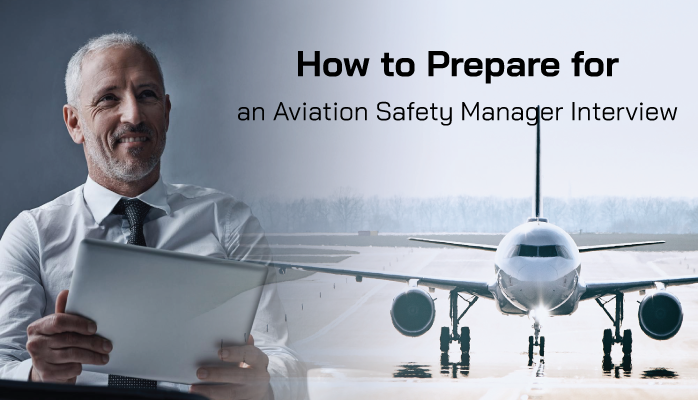An Aviation Safety Manager Interview

The role of an aviation safety manager is critical in ensuring the safety of aircraft operations, people on the ground, passengers, and crew.
These professionals oversee the
- development and maintenance of Safety Management Systems (SMS),
- ensure compliance with international and national regulations, and
- foster a culture of safety within their organizations.
Preparing for an interview for this position requires a deep understanding of the role, its requirements, and the ability to articulate your expertise effectively.
This article provides a comprehensive guide for global aviation safety managers to excel in their interviews, offering insights into the role, qualifications, common questions, and preparation strategies.
Understanding the Role of an Aviation Safety Manager
Aviation safety managers are responsible for the strategic oversight of safety within aviation operations. According to SKYbrary, they develop, operate, and continuously improve the SMS, acting as a focal point for safety issues. Their duties include:
- Developing SMS: Creating policies and procedures to identify and mitigate risks.
- Ensuring Regulatory Compliance: Adhering to standards set by bodies like the FAA or ICAO.
- Leading Safety Initiatives: Promoting a safety culture and training staff.
- Investigating Incidents: Analyzing accidents or near-misses to prevent recurrence.
The SMS framework, as outlined by the FAA, consists of four pillars: Safety Policy, Safety Risk Management, Safety Assurance, and Safety Promotion. Understanding these components is vital, as they form the backbone of the safety manager’s work.
Key skills include:
- Technical Knowledge: Expertise in SMS and aviation regulations.
- Leadership: Guiding teams and influencing safety culture.
- Communication: Liaising with regulators, staff, and stakeholders.
- Risk Management: Identifying and mitigating potential hazards.
Related Aviation Safety Manager Articles
- What Makes a Good Aviation Safety Manager?
- How Safety Managers Increase Their Power in Aviation SMS
- 5 Types of Aviation Safety Managers
Qualifications and Experience
To qualify for an aviation safety manager role, candidates typically need a robust educational and professional background. The following are common requirements:
- Education: A bachelor’s degree in aviation safety, occupational health and safety, or a related field. Advanced degrees can enhance candidacy.
- Certifications: Professional credentials like Certified Safety Professional (CSP) or Certified Industrial Hygienist (CIH) are often preferred. The American Association of Airport Executives (AAAE) offers the Accredited Airport Executive (AAE) certification, which demonstrates airport management expertise.
- Experience: At least five years in aviation safety roles, such as safety coordinator or officer, with hands-on SMS implementation experience.
Familiarity with regulations from the FAA, ICAO, or the European Union Aviation Safety Agency (EASA) is essential. Candidates should also demonstrate leadership in safety initiatives and the ability to handle complex operational challenges.
Common Interview Questions
Interviews for aviation safety manager positions often include a mix of general, behavioral, and technical questions. Below is a curated list of questions safety managers may expect:
| Question | Type | Purpose |
|---|---|---|
| Can you describe your experience with Safety Management Systems? | Technical | Assesses SMS knowledge and implementation experience. |
| How do you ensure compliance with aviation safety regulations? | Technical | Evaluates understanding of regulatory frameworks. |
| Tell me about a time you identified a safety hazard and how you addressed it. | Behavioral | Tests problem-solving and risk management skills. |
| How do you handle conflicts between safety and operational efficiency? | Situational | Gauges decision-making under pressure. |
| What is your process for investigating aviation incidents? | Technical | Checks incident analysis expertise. |
| Describe a time when you improved safety culture in an organization. | Behavioral | Assesses leadership and cultural influence. |
| How do you stay updated with aviation safety regulations? | General | Evaluates commitment to professional development. |
| What steps would you take to implement a new safety procedure? | Situational | Tests strategic planning and execution. |
| How would you respond to resistance to a new safety regulation? | Behavioral | Assesses interpersonal and persuasion skills. |
| What motivates you to work in aviation safety? | General | Gauges passion and alignment with role. |
These questions reflect the core competencies required, focusing on SMS, regulatory knowledge, and leadership.
Related Aviation Safety Manager Articles
- 7 Key Habits of Highly Effective Aviation Safety Managers
- Career Advice for Aspiring Safety Managers
- How to Tell If Aviation Safety Manager Is Doing Their Job
How to Answer Effectively

To stand out in an interview, candidates must answer questions with clarity and confidence. Here are strategies, supported by advice from Indeed and MockInterviewPro:
- Use the STAR Method for Behavioral Questions: Structure responses with Situation, Task, Action, and Result. For example, when asked, “Tell me about a time you identified a safety hazard,” you might say:
- Situation: At my previous airline, I noticed frequent near-misses during ground operations.
- Task: My role was to reduce these incidents to enhance safety.
- Action: I conducted a risk assessment, implemented new training, and introduced stricter protocols.
- Result: Near-misses decreased by 40% within six months.
- Demonstrate Technical Knowledge: For questions about SMS or regulations, provide specific examples. For instance, “I’ve implemented SMS by aligning with ICAO’s four pillars, ensuring proactive hazard identification and continuous improvement.”
- Show Enthusiasm and Commitment: Highlight your passion for safety. For example, “I’m motivated by the belief that every employee deserves a safe workplace, and I strive to make that a reality through robust SMS.”
- Sample Answer: For “How do you ensure compliance with aviation safety regulations?”:
- “I ensure compliance by maintaining a thorough understanding of FAA and ICAO standards, conducting regular audits, and training staff on regulatory requirements. In my previous role, I led a compliance program that reduced violations by 25% through proactive monitoring and corrective actions.”
Preparation Tips
Effective preparation can significantly boost your interview performance. Consider these steps:
- Research the Company: Study the organization’s safety culture, recent incidents, and operational scope. For example, review their safety reports or press releases to understand their priorities. Tailor your answers to align with their goals, such as emphasizing SMS if they recently adopted one.
- Review Your Experience: Prepare examples that showcase your skills in SMS implementation, incident investigation, or leadership. Quantify results where possible, e.g., “I reduced incident rates by 30%.”
- Practice Answering Questions: Rehearse with a colleague or mentor, focusing on both technical and behavioral questions. Practice articulating SMS concepts clearly.
- Understand Regulatory Bodies: Be familiar with relevant authorities (FAA, EASA, ICAO) and their SMS requirements. For instance, ICAO’s Annex 19 outlines SMS standards, which you can reference.
- Prepare Questions for the Interviewer: Ask about the company’s SMS maturity, recent safety challenges, or plans for safety enhancements. This shows engagement and interest.
Case Study: Successful Interview Preparation
Consider Jane, a candidate with seven years of experience as a safety coordinator. To prepare for an aviation safety manager interview, she researched the airline’s recent SMS adoption, reviewed ICAO’s SMS framework, and practiced STAR-based answers. During the interview, she highlighted a project where she reduced ground handling incidents by 35% through new protocols. Her thorough preparation and confident delivery secured the role.
Conclusion
Preparing for an aviation safety manager interview requires a strategic approach, combining role understanding, qualification alignment, and effective answering techniques. By mastering SMS concepts, showcasing relevant experience, and researching the company, candidates can confidently demonstrate their expertise. With thorough preparation, you can position yourself as the ideal candidate to lead safety initiatives in aviation.
Author's Note: If I were to interview for a safety manager's position, I'd read ICAO Document 9859 twice in the week preceding the interview. I'd also be very familiar with risk management workflows.






